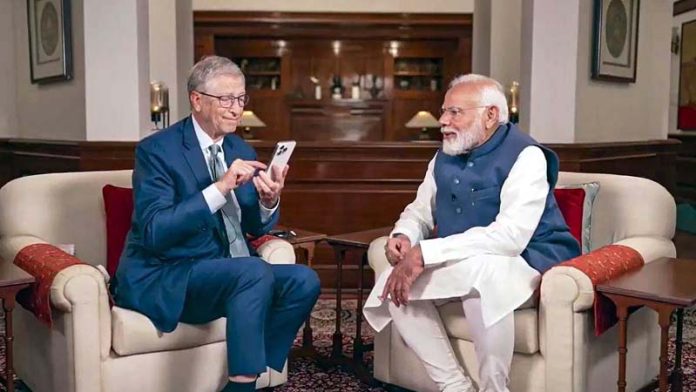
‘AI shouldn’t be seen as magic tool’
NEW DELHI, Mar 29: Prime Minister Narendra Modi on Friday said his Government wants to allocate funds to scientists for local research in cervical cancer for developing vaccines at a minimal cost to ensure all girls are vaccinated against the serious disease.
During an interaction with philanthropist and Microsoft co-founder Bill Gates on a host of issues, Modi said should the NDA be voted back to power, his priority will be to invest significantly in this research to safeguard the lives of India’s daughters.
“In the coming days, I want to allocate funds to our scientists for cervical cancer research targeting young girls. I want to give them budget and encourage them to conduct local research to make vaccines. My goal is to vaccinate all girls in our country at a minimal cost to ensure that they are protected from cancer,” Modi said.
“I am working in this direction these days. When my new Government will be formed, my priority will be to invest significantly in this research to safeguard the lives of India’s daughters,” he said.
On how India’s COVID vaccination campaign became successful with people showing little resistance to the jabs, where in many countries, the fear of vaccination and even rumours about them became a problem, Modi elaborated on how he led by example and followed all protocols to gain people’s trust and convinced them.
“I emphasised that the fight against the virus involves everyone and it was not virus versus Government. I viewed it as a fight of life versus virus from the beginning,” he said.
Secondly, he narrated, how he started to communicate openly with the nation from day one and personally adhered to all the safety protocols to set an example.
“I followed all COVID-19 protocols publicly to gain people’s trust. I made clarion calls to clap, clang utensils, light lamps despite some ridicule. It was crucial for me to unite everyone in this fight. Once the intent was set on protecting themselves and others around, it turned into a mass movement,” he said.
This ensured that the citizens followed his requests without questioning him. For example, he said when he advised them to wear masks, people listened and reminded each other.
“It transformed into a people’s movement. Because in a democracy, force isn’t the answer. In a democracy, people need to be convinced, educated and taken along. In democracy education and collaboration drive progress,” Modi stated.
This strategy played a significant role in the success of our vaccination campaign where the people did not resist, Modi said, highlighting that financial challenge was significant due to vaccine research costs.
“I also built people’s faith by being among the first to get vaccinated along with my 95-year-old mother getting the vaccine publicly. I led by example and gained people’s trust that this could save their lives,” he said.
He narrated an anecdote about the epidemic that broke out around 1930 when Sardar Vallabhbhai Patel was the mayor of the Ahmedabad Municipal Corporation, necessitating vaccination. The people had refused to get jabbed citing religious reasons.
Sardar Patel was firm and made vaccination mandatory to save lives, he said, adding that resistance to vaccines has been a challenge worldwide for centuries and “opening up discussions might help us overcome this”.
Identifying health as among the three sectors where he is most excited about the use of technology, Modi said his Government has built two lakh Ayushman Arogya Mandir health centres in the villages which are directly connected with the best hospitals through modern technology.
Initially, the patients wondered how they can be accurately diagnosed without a doctor physically examining them. But later they understood that with the right technological instruments, even a doctor sitting hundreds of kilometers away can indeed diagnose them correctly and give the correct advice. So people’s confidence is increasing, he said.
“Just the way it happens in big hospitals, things are happening in Ayushman Arogya Mandir. So, this is the power of digital platforms,” Modi stated.
He also mentioned how during the Covid, when the world struggled with issuing vaccine certificates, in India the people could easily use the Co-Win app to find out how far they needed to travel for getting the vaccine, select a suitable time slot and receive their certificate within seconds.
His Government made Co-Win open source allowing access to all. “In my experience, digital technology has significantly benefited our country,” he said.
Discussing the issue of AI, he said it should not be seen as a magic tool or something people should resort to out of their laziness to do some work.
Modi explained how he used AI in the G20 Summit as interpreter and also to broadcast his addresses in different languages in several events. A technology like ChatGPT should be used to constantly improve oneself, he added.
Highlighting his use of AI, Modi asked Gates to take a selfie through his (NaMo) app and then showed him how it could be located through the face-recognition technology.
Discussing the issue of climate change, Modi said the world needs to change parameters like use of electricity or steel to define development as it is anti-climate and should instead adopt terminologies like green GDP and green employment.
Recycling and reuse have been part of Indians’ nature, he said, mentioning that the jacket he was wearing was a recycled product.
Modi said he believes in leveraging technology not just to enhance services but also to significantly improve the ease of living for citizens.
The Prime Minister said his Government initiated storage of all university certificates in cloud storage to reduce costs and to fulfil various needs efficiently.
“Earlier, there was a push for stringent compliance requirements. But I advocated and ensured simplification, and made certain that data is uploaded to cloud (storage) with shared IDs, enabling us to access necessary information directly,” Modi said. (PTI)

